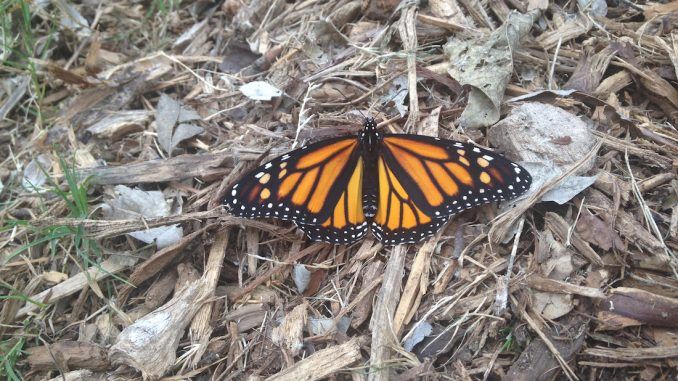
A recent study has revealed that butterflies in California are on the verge of becoming extinct due to the increasing use of Monsanto’s glyphosate-based herbicide, Roundup.
According to researchers, Roundup is one of the main contributing factors to the sharp decline in monarch butterflies over the last 20 years.
Naturalnews.com reports:

BYPASS THE CENSORS
Sign up to get unfiltered news delivered straight to your inbox.
You can unsubscribe any time. By subscribing you agree to our Terms of Use
Since 1997, monarch butterfly populations have decreased by a staggering 74 percent in California, home to one of the butterfly’s most highly populated migrating grounds. A crucial natural pollinator of North American crops, the world cannot afford to lose these marvelous orange and black six-legged creatures.
Aside from excessive commercial development of forested lands, the use of glyphosate-based herbicides has been a large reason for monarch butterfly population declines.
GLYPHOSATE HERBICIDES LINKED TO MONARCH BUTTERFLY DIE-OFFS
The use of glyphosate in North American agriculture has increased 15 times since genetically modified Roundup Ready crops were first introduced in the 1990s. Consequently, a study conducted by Isabel Ramirez at the Universidad Nacional Autonoma in Mexico, revealed “significant decreases” in monarch butterfly populations in hibernation areas across North America between the late 90s and today.
Ramirez’s study found that in 1997, monarch butterflies “occupied 20.97 ha (hectares)” of designated hibernation lands, while in 2014, they occupied “just 0.67 ha,” revealing a direct correlation between monarch die-offs and the introduction of glyphosate herbicides in the 1990s.
Many believe that the reason for this correlation is that glyphosate herbicides are killing mass amounts of milkweed, an essential food source for monarch caterpillars.
Viktoria Wagner, lead-author and plant ecologist at Masaryk University in the Czech Republic, conducted a study aimed at observing the decline in milkweed populations on 1.2 million acres of North American wildlands being treated with glyphosate herbicides in attempts to restore native plant species.
GLYPHOSATE KILLING MAIN SOURCE OF FOOD FOR MONARCH BUTTERFLIES
In her research she found an enormous lack of record keeping detailing the effects of glyphosate on both milkweed and the native species the project was attempting to restore.
More shockingly though, Wagner discovered that the “intensive use of glyphosate on farms has, for instance, incidentally destroyed tens of millions of acres of nativemilkweed.” Because of milkweed’s crucial importance to monarch caterpillars, Wagner’s study found the drastic losses of milkweed to be a “major factor in the dramatic decline of the butterfly species.”
What makes matters even worse, is that milkweed is widely considered a low-impact weed, meaning it contributes very little to crop loss, making its destruction and consequential impact on the monarch butterfly unnecessary.
While measures are being taken to help restore milkweed populations, the extent of glyphosate’s damage to monarchs is being completely downplayed by the pesticide industry.
For instance, the Mexican government has prohibited illegal logging of forests where monarchs spend their winters, and the U.S. government has developed new programs to increase milkweed abundance, but neither addresses the problem that glyphosate poses.
Independent scientists have vocally condemned these corporately funded measures for ignoring “the most evident cause of their [monarchs’] decline – the destruction of their breeding grounds by widespread glyphosate-use in America’s GM crop farms.”
Aside from contributing to declines in monarch butterfly populations, glyphosate has also been linked to a myriad of adverse human health conditions and alarming declines in honeybee populations. As the facts continue to pile up, the case for banning glyphosate is becoming increasingly overwhelming. Perhaps federal governments will wake up one day and realize that the protection of the world’s habitats and its people is far more important than maintaining the interests of corrupt corporate lobbyists.


Be the first to comment